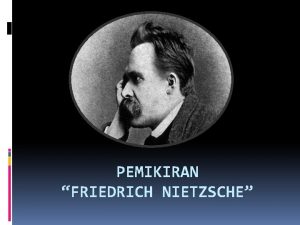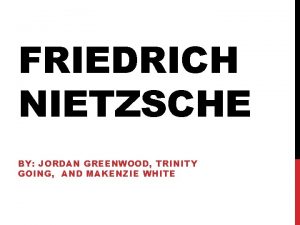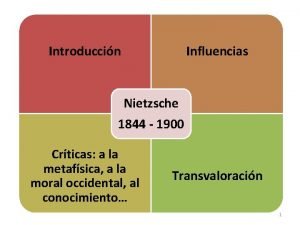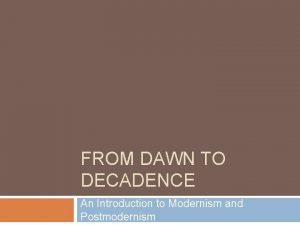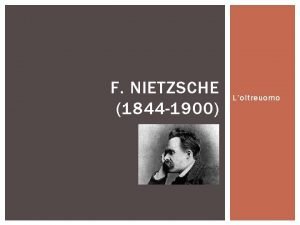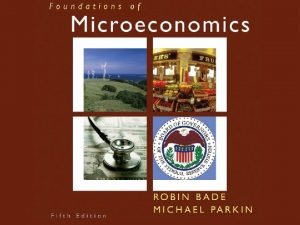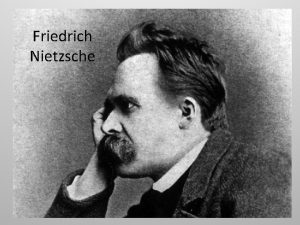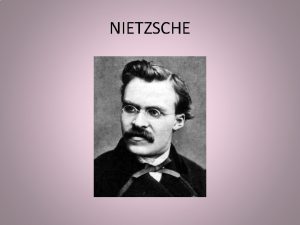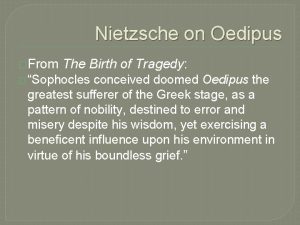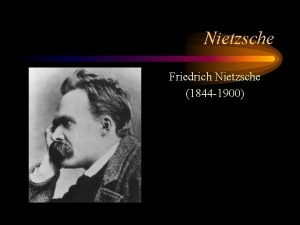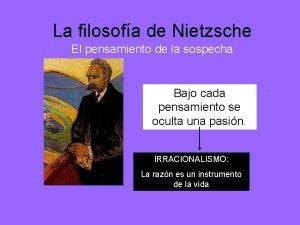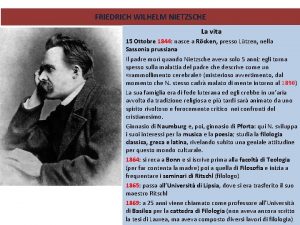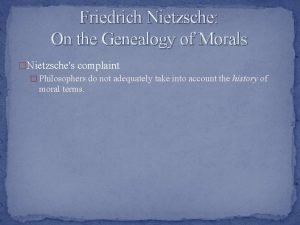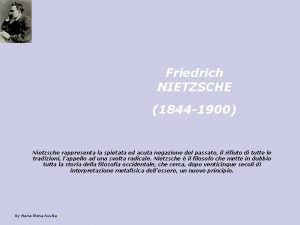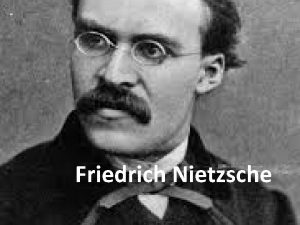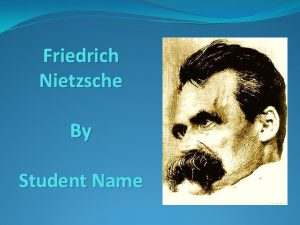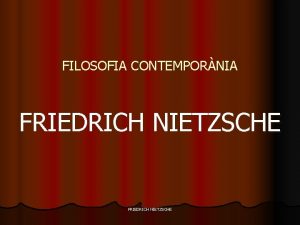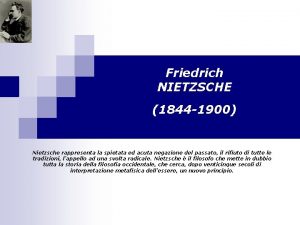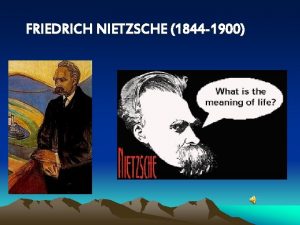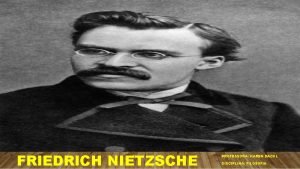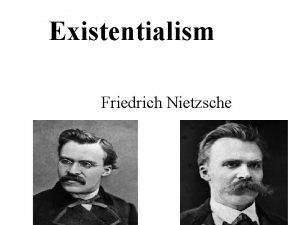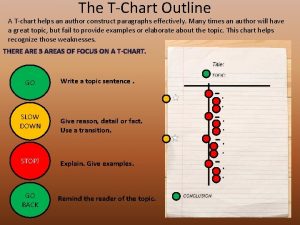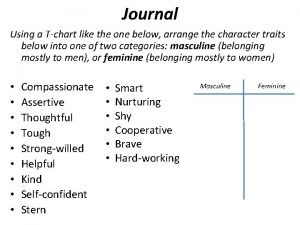Friedrich Nietzsche Draw a Tchart like this one






















- Slides: 22

Friedrich Nietzsche

Draw a T-chart like this one in your notes. What Nietzsche criticizes? What Nietzsche values? • What ideologies and emotions does he reveal as inferior? • What do the quotations reveal are good qualities?

What does this quote suggest about Nietzsche? “A society that definitely and instinctively gives up war and conquest is in decline: it is ripe for democracy and the rules of shopkeepers – In most cases, to be sure assurances of peace are merely narcotics. ”

What does this quote suggest about Nietzsche? Democracy represents the disbelief in great human beings and an elite society: “Everyone is equal to everyone else. ” “At bottom we are one and all self-seeking cattle and mob. ”

What does this quote suggest about Nietzsche? “A declaration of war on the masses by higher men is needed! Everywhere the mediocre are combining in order to make themselves master! Everything that makes soft and effeminate, that serves the ends of the ‘people’ or the ‘feminine’ works in favor of suffrage universal, i. e. , the dominion of inferior men. ”

What does this quote suggest about Nietzsche? “The root of all evil: that the slavish morality of meekness, chastity, selflessness, absolute obedience, has triumphs…the best things have been slandered because the weak or the immoderate swine have cast a bad light on them – and the best men have remained hidden – and have often misunderstood themselves. ”

What does this quote suggest about Nietzsche? “What is good? – All that heightens the feeling of power, the will to power, power itself in man. What is bad? – All that proceeds from weakness. What is happiness? – The feeling that power increases – that resistance is overcome. ”

What does this quote suggest about Nietzsche? “One should not embellish or dress up Christianity: it has waged a war to the death against this higher type of man, it has excommunicated all the fundamental instincts of this type, it has distilled evil, the Evil One, out of these instincts – the strong human being as the type of reprehensibility, as the ‘outcast. ’”

Nietzsche’s Beliefs • challenged the belief in progress and human reason • valued creativity over reason • believed that, since God is dead, no moral values were revealed by God • challenged Christianity and argued the individual could only find meaning through exerting the human spirit

Nietzsche’s superman or overman “Not ‘mankind’ but overman is the goal!. . . This world is the will to power – and nothing besides! And yourselves are also this will to power – and nothing besides. ”

Nietzsche’s superman or overman “The individual has always had to struggle to keep from being overwhelmed by the tribe. If you try it, you will be lonely often, and sometimes frightened. But no price is too high to pay for the privilege of owning yourself. ”

Nietzsche’s superman or overman “You need chaos in your soul to give birth to a dancing star. ”

Nietzsche’s Superman • • higher type of human asserts his will makes great demands on himself lives life with a fiery joy aspires to self-perfection creates his own values and defines his own life understands that people strive for power sees life as a contest in which the enhancement of power is the ultimate purpose of our actions

Nietzsche’s Reputation • remains to be associated with composer Richard Wagner, who dedicated his art to German nationalism • associated with the rise of Hitler and the Nazis, since some of Nietzsche’s ideas were used to justify atrocities

Fyodor Dostoevsky • Russian writer of short stories and novels • gambler and alcoholic, often in debt and poverty • wrote Crime and Punishment

Crime and Punishment • Raskolnikov, a student, kills an old Jewish lender. • He uses a superman theory based on utilitarian theory to justify the murder. • His guilty conscience torments him while he is being investigated for the murder.

Mary Shelley • daughter of Mary Wollstencraft and William Godwin • married P. B. Shelley, a poet and radical • wrote Frankenstein

Frankenstein • Dr. Frankenstein creates a human-like creature but abandons it in horror. • The creature, alone, abandoned and shunned by those he meets, turns to revenge.

P. B. Shelley • Romantic poet • radical nonconformist • wrote Prometheus Unbound

Prometheus Unbound • retells Aeschylus’ story about Prometheus, who is punished for defying Zeus to help humans • symbolic story about the origins of evil and possibility of overcoming it

Lord Byron • Romantic poet • close relationship with Mary Shelley and P. B. Shelley • died in Greece helping its war for independence from the Ottoman Empire • wrote Manfred

Manfred • written when Byron lived in the Swiss Alps • Manfred is a Byronic hero: – He rejects a pact with the devil. – He becomes totally autonomous, independent of any external authority or power.
 Slave morality vs master morality
Slave morality vs master morality Nietzsche vereinsamt
Nietzsche vereinsamt Pemikiran friedrich nietzsche
Pemikiran friedrich nietzsche Nietzsche
Nietzsche Friedrich nietzsche
Friedrich nietzsche Friedrich nietzsche on christianity
Friedrich nietzsche on christianity Il superuomo
Il superuomo Tchart
Tchart Tchart swift
Tchart swift Expository essay introduction examples
Expository essay introduction examples Tchart
Tchart Nihilists
Nihilists Slave morality vs master morality
Slave morality vs master morality Nietzsche como precursor de la posmodernidad
Nietzsche como precursor de la posmodernidad Pecado de la soberbia
Pecado de la soberbia Nietzsche oedipus
Nietzsche oedipus Master morality
Master morality Crisi delle certezze collegamenti maturità
Crisi delle certezze collegamenti maturità Características de la transvaloración
Características de la transvaloración Etapas de nietzsche
Etapas de nietzsche L'eterno ritorno di nietzsche
L'eterno ritorno di nietzsche Master morality
Master morality Nietzsche guerra come rimedio
Nietzsche guerra come rimedio


